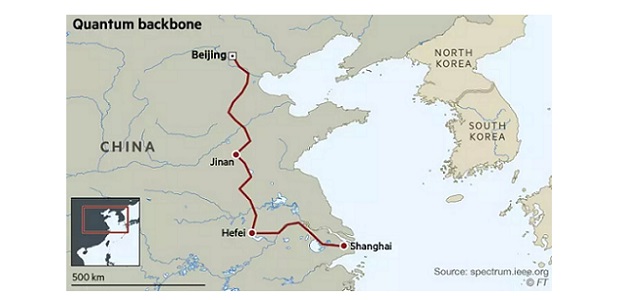China trial paves way for ‘unhackable’ communications network by using more secure channel than a telephone or internet cable

A Chinese city has successfully trialled an “unhackable” communications network, raising hope of a rollout of the world’s first widescale commercial application of quantum communications. The local government of Jinan, a city in eastern China, told the Financial Times that its departments would begin using the network by the end of August.
“We plan to use the network for national defence, finance and other fields, and hope to spread it out as a pilot that if successful, can be used across China and the whole world,” said Zhou Fei, assistant director of Jinan Institute of Quantum Technology, the research institute involved in the project.
The result is a boost for the Beijing-Shanghai quantum network, which is under construction. This uses Jinan, which lies between the two cities, as an inter-city hub to route messages.
Quantum key distribution (QKD) networks are more secure than widely used electronic communication forms. A classical channel, such as a telephone or internet cable, can be tapped by an eavesdropper without the sender or recipient being aware. But if a quantum channel is tapped, it alters the information being relayed, and the disturbance alerts the parties using it that something is amiss.
In QKD networks, a secure cryptographic “key”, or password, is sent between two parties over the network, which they can use to encrypt future communications. If the key is interfered with, the two parties know not to use it.
The Beijing-Shanghai network is set to host the world’s longest land-based quantum communication channels, stretching over 2,000km, and will be used by commercial banks across the two cities’ financial hubs and by the government.
The trials involved sending highly secure information between 200 different terminals in Jinan over a network covering several hundred square kilometres.
Aside from increasing the security of payments and other financial services, the network would make it almost impossible for other governments to listen in on Chinese communications, once properly implemented.
Chinese policymakers have been concerned about protecting domestic cyber space since whistleblower Edward Snowden’s revelations of US-sponsored internet surveillance and amid growing awareness of the cost of hacking attacks. As a result, government support has poured into quantum research.
“China has achieved staggering things with quantum research,” said Tim Byrnes, a quantum physicist at New York University’s Shanghai campus. “It’s amazing how quickly China has gotten on with quantum research projects that would be seen as too expensive to do elsewhere.”
China made another research breakthrough last month when its quantum satellite — the first in the world — sent a message to Earth on a quantum communication channel. “Quantum communication has been taken up by the commercial sector much more in China compared to other countries, which means it is likely to pull ahead of Europe and the US in the field of quantum communication,” Mr Byrnes added. Switzerland, Austria and Japan already have small QKD networks mostly for use by universities doing research on the technology.
Dariusz Mazurkiewicz – CEO at BLIK Polish Payment Standard
Banking 4.0 – „how was the experience for you”
„To be honest I think that Sinaia, your conference, is much better then Davos.”
Many more interesting quotes in the video below:









